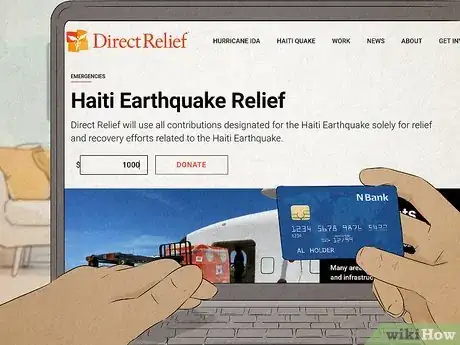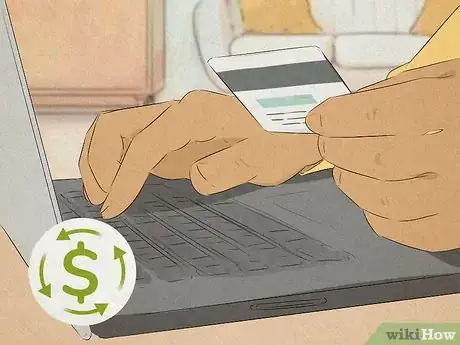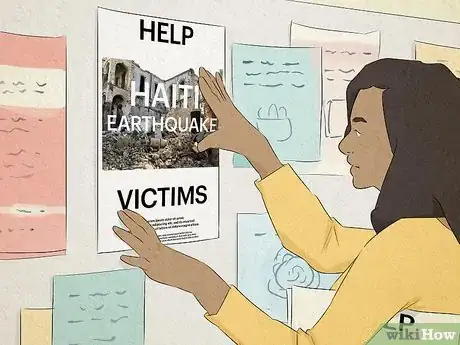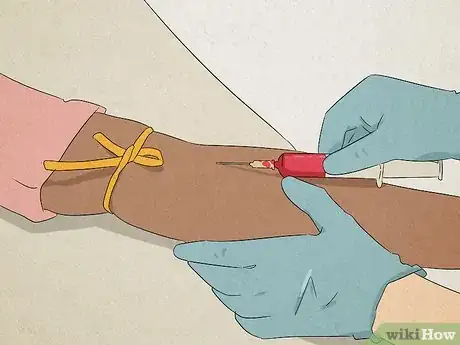This article was co-authored by Direct Relief and by wikiHow staff writer, Megaera Lorenz, PhD. Direct Relief is an award-winning humanitarian aid organization, active in all 50 states and more than 80 countries. They focus on helping people affected by emergencies and natural disasters. Direct Relief has been highly rated by Charity Navigator, GuideStar, and the Center for High Impact Philanthropy at University of Pennsylvania, for their effectiveness, efficiency, and transparency.
There are 21 references cited in this article, which can be found at the bottom of the page.
This article has been viewed 16,909 times.
On August 14, 2021, Haiti was struck by a devastating earthquake. You may be wondering what you can do to help the millions of people affected by this disaster. In this wikiHow, we’ll talk you through some of the most effective ways to lend a hand, from donating money to volunteering your time.
Steps
Donating
-
1Donate money to local nonprofits. In the wake of a disaster, monetary donations tend to make the greatest impact. And, in many cases, local charities and relief organizations are in the best position to make sure the money goes where it’s needed.[1] Give money to reputable organizations based in Haiti, such as:
- HaitiOne: https://www.haitione.org/
- Fonkoze: https://fonkoze.org/
- Haiti Emergency Relief Fund (HERF): http://www.haitiemergencyrelief.org/
- What If? Foundation: https://whatiffoundation.org/
- Health Equity International/St. Boniface Hospital: https://healthequityintl.org/
- FOKAL Haiti Relief: https://ademen.org/fokal-haiti-relief-fund/
- Haiti Communitere: https://haiti.communitere.org/
-
2Give to reputable international organizations. Relief organizations around the world are stepping up to help. To find organizations and charities currently helping in Haiti, check out Charity Navigator’s list of highly-rated nonprofits. A few good options include:[2]
- Direct Relief: https://www.directrelief.org/emergency/haiti-earthquake-2021/
- World Hope International: https://www.worldhope.org/emergency-relief/haiti-earthquake/
- Team Rubicon: https://teamrubiconusa.org/operations/haiti-earthquake-response/
- Hope for Haiti’s Children: https://www.hopeforhaitischildren.org/
- Save the Children: https://www.savethechildren.org/us/what-we-do/emergency-response/haiti-emergency
- International Relief Teams: https://www.irteams.org/project/haiti-earthquake
- Haitian Health Foundation: https://www.haitianhealthfoundation.org/
- Heart to Heart International: https://www.hearttoheart.org/our-work/haiti-operations/
- Doctors Without Borders: https://www.doctorswithoutborders.org/what-we-do/countries/haiti
Advertisement -
3Research charities before you donate. Unfortunately, not all charities will put your donation to good use—it is important to be able to identify such scams beforehand. Before you donate to any organization, look them up on websites like Charity Navigator, GiveWell, CharityWatch, or the Better Business Bureau. Check out ratings, reviews, and breakdowns of how these organizations use their funds.[3] You can also directly review financial disclosures and impact reports from nonprofits using GuideStar.
- When reading up on a charity, use search terms like “rating,” “complaint,” “review,” or “scam.”[4]
- Unfortunately, even reputable organizations don’t always use donations appropriately. After the 2010 Haiti earthquake, investigators found that the Red Cross may have misused millions of dollars of donations meant for earthquake relief.[5] For this reason, it’s always a good idea to do your research, even if you’re already somewhat familiar with a charity and its work.
-
4Use caution when donating to crowdfunding campaigns. Crowdfunding or social media campaigns might seem like good options for directly helping people in need. However, they can often be misleading. Unless it’s someone you already know and trust, search for information about the person or organization behind the campaign before you hit the “Donate” button.[6]
- Check the campaign website and ensure that it offers detailed information about how your money will be used.
- Do a search using the name of the crowdfunding campaign along with terms like “scam,” “review,” or “reputation.”
-
5Set up a recurring donation to help long-term. Disaster recovery can take many years. To do the most good, consider signing up for a regular donation that can be withdrawn automatically from your bank account. Your recurring donations can continue to help with relief and rebuilding efforts long after the initial disaster took place—and after other sources of funding are no longer available.[7]
- Most charities offer an option for making recurring gifts. You may be able to give monthly, biweekly, or even set your own custom donation schedule.
-
6Ask before donating items. Before sending food, clothing, or other items to relief organizations in Haiti, contact them and find out if these items are actually needed or wanted. Unfortunately, unsolicited material donations often do more harm than good by taking up time and space that could be better used in other ways.[8]
- Most relief organizations will get a lot more use out of a monetary donation. They can channel your money exactly where it’s needed most.[9]
- Instead of donating items, consider selling them and donating the proceeds to a charity or relief organization. You could even organize a community rummage sale to raise even more money.[10]
Taking Action
-
1Start a fundraiser. Spread the word to your friends, family, coworkers or classmates, and other people in your community that you are raising funds to help victims of the Haiti earthquake. The more people you get involved, the more of a difference you can make! One of the simplest things you can do is to send out a link to your favorite charity and invite people to donate. You could also:[11]
- Organize a fundraising walk.
- Stage a show or performance and donate the cost of admission to charity.
- Put together a matching donations program at work or school.
- Hold an auction or raffle and donate the money you make to charity.
- Host a fundraising party or game night.
- Run a donation drive on Facebook for your favorite organization, using Facebook’s nonprofit fundraiser tool.[12]
- Volunteer with your favorite charity or relief organization to run an online fundraiser or do some phone banking.
-
2Raise awareness in your community. Post news about the earthquake on social media, or ask if you can put up flyers at your school, workplace, or local community center. Provide information about relief efforts, and let people know how they can help.[13]
- You could also write a letter to your local newspaper or contact your local news station and request that they share information about how people can help.
- The Center for International Disaster Information provides a template you can use to share information about disasters and responsible giving with your local news media: https://www.cidi.org/wp-content/uploads/Letter-to-the-Editor-Template.pdf.
-
3Volunteer with an organization that’s helping in Haiti. Check with your favorite relief organization(s) and see if they’re currently accepting volunteers. They may be particularly interested in working with people with special expertise (such as medical training or experience with sanitation work), who have previous disaster relief experience, or who speak the local languages (French or Haitian Creole).[14]
- Some organizations, such as Habitat for Humanity, may be looking for volunteers to work on the ground in Haiti.[15] You can also look for opportunities using websites like https://www.volunteermatch.org/.
- Even if they’re not looking for volunteers to work on-site, some charities or disaster relief organizations might need people to make phone calls or do other administrative work for them.
-
4Donate blood. Medical workers in Haiti are seeking donations. If you live in Haiti, consider donating blood through an organization like the Haitian Red Cross or Doctors Without Borders (Medecins Sans Frontieres).[16]
- Even if you don’t live in Haiti, your donation may help. Many countries, including the U.S., are able to export blood products overseas to areas where they’re urgently needed.[17]
-
5Open your home to displaced families. Hundreds of thousands of people are homeless and in need of shelter after the earthquake.[18] If you live in Haiti, consider offering to host an individual or family in need. Contact organizations such as Global Shelter Cluster to find out if they are currently looking for host families to take in displaced people.[19]
- Airbnb has partnered with various disaster relief organizations to support hosts who want to provide shelter for people in need. To find out how to become an Airbnb emergency host and offer free stays, visit https://www.airbnb.org/get-involved.
- As the situation develops, it’s possible that people affected by the earthquake will be looking for temporary housing outside of Haiti. If you don’t live in Haiti, check with organizations that work to provide shelter for refugees and other displaced people, such as the UNHCR, to find out if you can help.[20]
-
6Offer emotional support. Natural disasters can be deeply traumatizing. If you know anyone who has been affected by the earthquake, do your best to be there for them. Just giving them a call or reaching out over social media can make a big difference. You can also direct them to the mental health hotline at 2919-9000.[21]
References
- ↑ https://www.nbcnews.com/news/nbcblk/haitian-organizations-are-leading-relief-efforts-rcna1709
- ↑ https://www.charitynavigator.org/index.cfm?bay=content.view&cpid=8990&search-box
- ↑ https://www.npr.org/2021/08/17/1028421310/haiti-earthquake-how-to-help
- ↑ https://www.consumer.ftc.gov/features/how-donate-wisely-and-avoid-charity-scams
- ↑ https://www.npr.org/2016/06/16/482020436/senators-report-finds-fundamental-concerns-about-red-cross-finances
- ↑ https://www.consumer.ftc.gov/articles/donating-through-crowdfunding-social-media-and-fundraising-platforms
- ↑ https://www.councilofnonprofits.org/tools-resources/disaster-recovery-what-donors-and-nonprofits-need-know
- ↑ https://www.cidi.org/how-to-help/unsolicited-donations/
- ↑ https://www.cidi.org/how-to-help/why-cash-is-best/
- ↑ https://www.cidi.org/wp-content/uploads/55-Repurposing-Ideas.pdf
- ↑ https://www.cidi.org/wp-content/uploads/100-Fundraising-Ideas.pdf
- ↑ https://www.facebook.com/help/356680401435429/
- ↑ https://www.cidi.org/how-to-help/toolkit/
- ↑ https://www.cidi.org/how-to-help/volunteering/
- ↑ https://www.habitat.org/our-work/disaster-response/volunteer
- ↑ https://www.doctorswithoutborders.org/what-we-do/news-stories/news/haiti-earthquake-msf-responds-urgent-medical-needs
- ↑ https://www.redcross.org/about-us/news-and-events/news/Red-Cross-Working-across-Borders-to-Ensure-Haitis-Blood-Supply.html
- ↑ https://reliefweb.int/report/haiti/iom-appeals-usd-15-million-critical-needs-families-affected-haiti-earthquake
- ↑ https://www.sheltercluster.org/response/2021-haiti-earthquake
- ↑ https://www.unhcr.org/en-us/shelter.html
- ↑ http://www.gtrinc.org/haiti-.html


























































